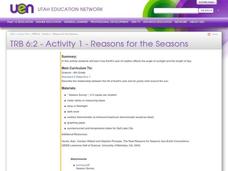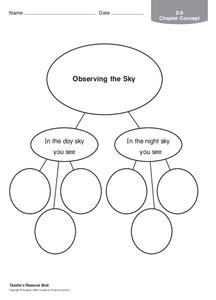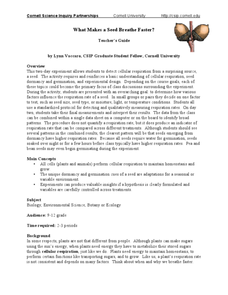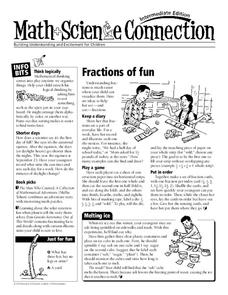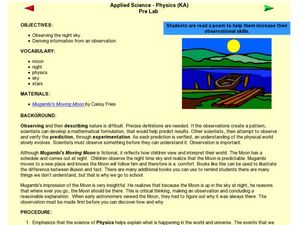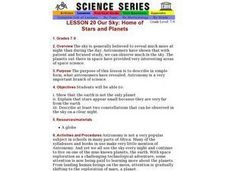Curated OER
Reasons for the Seasons
Students discover how the Earth's axis of rotation affects the angle of sunlight and the length of day. They take a survey and give the survey out to family members and friends. They tally their findings and then determine the correct...
Curated OER
Reasons for the Seasons
Sixth graders conduct and analyze a survey that explores public perceptions about the reasons for seasonal change. They measure the changing length of days, observe shadows and discuss how the Earth's axis of rotation affects the seasons.
Curated OER
The Celestial Sphere and Circumpolar Motion
Students investigate the celestial sphere and circumpolar motion. In this science lesson, students view an applet, The Celestial Sphere and Circumpolar Motion. Students discuss the Earth's rotation and stellar movement.
Curated OER
It's Time to Make Time!
Students explore the evolution of time measurement, and explain the relationship of sunrise/sunset to length of daylight. They collect data and calculations to determine length of daylight during a given day.
Curated OER
Shadows
Young scholars measure shadows at different times of the day to determine when a shadow casts its longest and shortest shadows.
Curated OER
Sundials: Observing and Using Shadows
Learners build sundials and observe changes in shadows over the course of one or more days. They identify patterns in the shadows and discuss how shadows may be used to tell time.
Curated OER
Observing the Sky
In this sky worksheet, students will write down 3 things they see in the sky during the day and 3 things they see in the sky at night. This worksheet is a graphic organizer.
Curated OER
The Effects of Color on Heat Absorption And Climate
Students conduct an experiment to determine the effects of soil color on its day and night time temperatures. In small groups, they prepare dishes of black soil, brown peat moss, and white sand. They record the temperature changes when a...
Curated OER
Activity Sheet: What Do You Do? Forest Ecologist
In this ecology worksheet, students read an interview with a forest ecologist before they act as an ecologist and spot the difference between two forest scenes on a black and white worksheet. They circle the wildlife and the clues left...
Curated OER
Fossil Fuels (Part II), The Geology of Oil
More of a mini-unit than a lesson, these activities lead inquisitors through a survey of oil deposits. In the first part, they read about and view diagrams of sedimentary rock layers that trap oil. Next, they test porosity and...
Curated OER
Venus
Looking for a good instructional activity to help teach about the planet Venus? This instructional activity is for you! An excellent photograph of Venus accompanies three paragraphs of text. Learners answer five multiple choice questions...
Curated OER
What Makes a Seed Breathe Faster?
Here's a five-star lesson plan in which inquisitors conduct sophisticated experimentation with cellular respiration in plant seeds. Placing seeds in a closed system they measure the amount carbon dioxide produced and relate it to...
Curated OER
Jonas Salk: He Led the Battle Against Polio
Do you know who Jonas Salk is? Print these pages and have your middle and high schoolers read his biography in Time magazine. The reading itself is short, and it is followed with a key date chart, three reading questions, two connection...
Resources for Educators
Fractions of Fun
Reinforce concepts and encourage learner engagement with a collection of math games, science experiments, and cross curricular activities. In one fun resource, learners sort objects, keep a diary of everyday fractions, play a game using...
Council for the Curriculum, Examinations and Assessment
Victorian Historians
Take the class back in time to the Victorian Era! The resource provides a plethora of activities that create experiences for scholars in class. Some activities include a fun fair, viewing the starry-night painting, and even experiencing...
Curated OER
Bill Nye Video: Earth's Seasons
For this earth's seasons worksheet, students answer fill in the blank questions after seeing Bill Nye's video. Topics include the rotation of the earth around the sun, the tilt of the earth, the time zones and sunlight.
Curated OER
The Mathematician And The Archaeologist
Students decorate clay pots and destroy them in order to learn the techniques of modern-day archaeologists and practice mathematical measurements. This is an exciting lesson suitable for Social Studies, Math, Science, or Art classroom.
Curated OER
Making Clouds: Aerosol-Cloud Interactions in a Beaker
Students observe a teacher demo on how clouds form. In this earth science lesson, students discover how cloudiness affects relative humidity. They explain the scattering of light by clouds.
Curated OER
Let the North Star Tell You Where You Are
Students create an astrolabe and locate the North Star in the night sky. They determine the latitude of the North Star, and calculate an average latitude based on class results.
Curated OER
Let the North Star Tell You Where You Are
Students participate in activities in which they find the Big Dipper and locate the North Star in the night sky, examine the relationship between the angle to Polaris and latitude, and determine latitude by using an astrolabe.
Curated OER
Poetry and Observations
Young scholars compare poetry and the night sky. In this poetry instructional activity, students read poetry and compare the imagery from the poem with the night sky. Young scholars explore how science and poetry relate to one another.
Curated OER
Our Sky: Home of Stars and Planets
Students discover that astronomy is a branch of science that includes the study of planets, stars, and constellations.
Curated OER
Charting Seasonal Changes
Students research the Earth's patterns of rotation and revolution, create a chart and graph of these patterns and use them to explain the causes of night and day and summer and winter.
Curated OER
Space: Stars and Planets
Students observe and report that the moon can be seen sometimes at night and sometimes during the day. They describe how changes to a model can help predict how the real thing can be altered. Students explain the essential fact of the...



